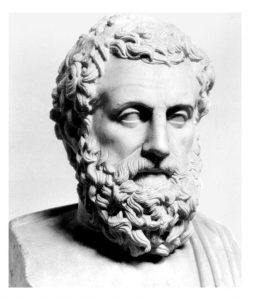John Kaag in The New York Times:
 Three years ago, New Year’s came and I promised to eat only organic. I lasted two weeks. A year ago, I resolved to run before dawn and take a cold shower every morning. That lasted two days. This year, I don’t have a resolution. Instead I read Edith Hall’s “Aristotle’s Way: How Ancient Wisdom Can Change Your Life,” and concluded I probably didn’t have to undergo some painful — and therefore temporary — transformation to remake my life. I just had to put some sustained effort into being properly happy.
Three years ago, New Year’s came and I promised to eat only organic. I lasted two weeks. A year ago, I resolved to run before dawn and take a cold shower every morning. That lasted two days. This year, I don’t have a resolution. Instead I read Edith Hall’s “Aristotle’s Way: How Ancient Wisdom Can Change Your Life,” and concluded I probably didn’t have to undergo some painful — and therefore temporary — transformation to remake my life. I just had to put some sustained effort into being properly happy.
There is a pernicious, but widely held, belief that turning over a new leaf always involves turning our worlds upside down, that living a happy, well-adjusted life entails acts of monkish discipline or heroic strength. The genre of self-help lives and dies on this fanaticism: We should eat like cave men, scale distant mountains, ingest live charcoal, walk across scalding stones, lift oversize tires, do yoga in a hothouse, run a marathon, run another. In our culture, virtuous moderation and prudence rarely sell but, taking her cues from Aristotle, Hall offers a set of reasons to explain why they should.
Hall’s new book clears a rare middle way for her reader to pursue happiness, what the ancient Greeks called eudaimonia, usually translated as well-being or prosperity. This prosperity has nothing to do with the modern obsession with material success but rather “finding a purpose in order to realize your potential and working on your behavior to become the best version of yourself.” It sounds platitudinous enough, but it isn’t, thanks to Hall’s tight yet modest prose. “Aristotle’s Way” carefully charts the arc of a virtuous life that springs from youthful talent, grows by way of responsible decisions and self-reflection, finds expression in mature relationships, and comes to rest in joyful retirement and a quietly reverent death. Easier said than done, but Aristotle, Hall explains, is there to help.
More here.
